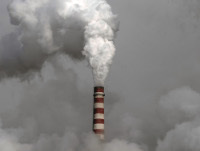Most recent intrigues of Kyoto Protocol
The Kyoto Protocol has become that document in the international politics that world leaders prefer not to think about. The issue is particularly painful for the U.S., China and India. Will there be an extension of the protocol, or are the interested players wasting their time? This question was raised in "Point of View" project by Doctor of Technical Sciences Igor Ostretsov.

Igor, it seems that the Kyoto Protocol, an important international instrument on the emission of greenhouse gases into the atmosphere has been forgotten. Why has it happened?
"It's true. After all, what is the history of the Kyoto Protocol? It appeared in the mid-1990s, Russia ratified it only in 2005, and even then with difficulty. In 2012 it has expired. Then there were several meetings on its extension. As far as I know, only one thing has been agreed upon - to create the final version of the protocol by 2015 so that it is ready to operate in 2020.
I think that all those involved in this protocol are 100% percent sure that by that time the situation will be resolved one way or another. Either consumption will be reduced dramatically thanks to Western consumers, or there will be a sharp decline in population in some way. This is precisely why today the Kyoto Protocol is not discussed. There is little or no discussion because China and India (the main consumers of the future) have refused to ratify the Kyoto Protocol. Because, roughly speaking, what is the contradiction? Developing countries, especially China and India, demand defining quotas in proportion to the population, while the United States request to leave everything as is, and even reduce a little.
China and India cannot agree to this as they go through development, and the internal situation in the countries is extremely acute. Something has to be done. Therefore, the main consumers, the U.S, China and India are standing by. This means that in fact the Kyoto Protocol is non-existent, everyone is silent. Therefore, the most important issue related to energy consumption is not discussed at G-20, and instead corruption is discussed."
What is the situation like with the conservation of natural resources in Russia? It seems that there is very little talk about it and very little is done. There is Greenpeace, for example, the worldwide organization. What do you think of its activities in the field of ecology?
"In the Soviet times, when the development was fast, the energy component was not considered much, especially after the discovery of massive reserves in Siberia. There are still some undeveloped territories there. There are resources, of course. But when the Kyoto protocol has emerged, it had a beneficial effect on Russia, I believe, as many have realized that the import of advanced technology and respect for the resources would allow selling quotas.
And we did sell a lot, earned some money. Technology has improved. This involved improvement of the atmosphere, reduction of emissions, but nevertheless it is not the main direction as it does not change the situation dramatically.
Compliance with the environmental standards for each particular firm, for each producer should be the most important task. This must be monitored by supervising organizations. I think that a lot is being done in Russia in this direction, but it is not done on a global scale."
Pravda.Ru
Subscribe to Pravda.Ru Telegram channel, Facebook, RSS!


